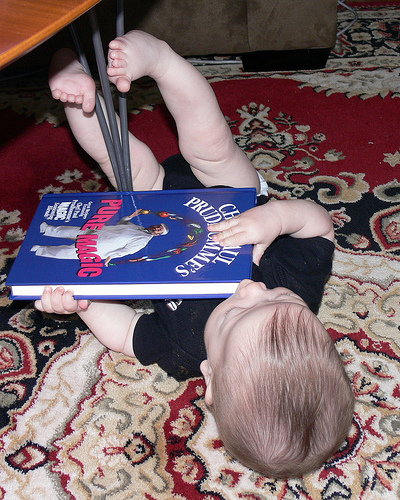Reading furnishes the mind only with materials of knowledge; it is thinking that makes what we read ours. – John Locke

Yes, he said that we have to “chew them” to get nourishment, but somehow I just don’t think that is what he meant…
What does that mean?
The longer, twitter unfriendly version is as follows:
This is that which I think great readers are apt to be mistaken in; those who have read of everything, are thought to understand everything too; but it is not always so. Reading furnishes the mind only with materials of knowledge; it is thinking that makes what we read ours. We are of the ruminating kind, and it is not enough to cram ourselves with a great load of collections ; unless we chew them over again, they will not give us strength and nourishment.
To me, this quote is about the difference between knowing something and understanding it. Reading is fairly easy. You can even memorize facts and whole documents.
But until you actually think about it, until you cut it up, chew on it, and thoroughly digest that information, you don’t really know it. You probably remember memorizing things in grade school. Why? Who knows. We just did as we were told.
And that is what the quote is warning us against. Without taking the time to consider the context, what might or might not be relevant, and so many other details, they are just facts or words.
Why is thinking important?
That sounds kind of silly on the face of it, but I’m serious. So many people don’t think. And those who do, often only think to the first step. The former is “I want, I grab!” like a two year old. The latter is “I want, I’ll pay for it!” like a more mature person.
But what did you just buy? Are there other costs? Are there other implications or responsibilities that go along with it? The first sees a nice car, and steals it. The second sees a nice car and buys it. But did they plan for insurance? Did they go to a mechanic and have it checked out?
Far too often it is the second (or third) step that gets you. To me, life is like a chess match. If all you are doing is looking at the board and trying to get the best move for this turn, you may have some good days, but many will be less than good. The better strategy requires thinking farther ahead.
By thinking a little farther ahead, you can often avoid serious (and sometimes funny) consequences of your actions. The person who stole the car didn’t plan on getting caught and being sent to jail. If they’d thought a bit deeper, that would have been a logical possibility, even a probability. Think!
Where can I apply this in my life?
My recommendation would be everywhere in your life. That said, it may take you a while to get into the habit of thinking through a problem and into the subsequent possibilities. Even after decades of training, I still screw up from time to time. It happens. Learn from it, and do better next time.
There are, of course, emotional issues, which can cause serious thought to be difficult when you are in the middle of it. The trick there is to anticipate what might happen, and think about it before hand. However there is a fine line between worrying and analyzing possibilities. Try to avoid that trap.
There are plenty of methods to help you make a decision. But for the purposes of this quote, you want to go deeper. Once you think you have a decision, think about what happens next. Come up with a couple of ideas, and how likely each might be. Then adjust your decision to make the result even better.
You can start small, but you can try it on any decision. Lunch? Hmmm. Pepperoni pizza with onions sounds great, but you have a date tonight… If you don’t think beyond your hunger at that moment, you could have a very short night, right? I imagine you can think of plenty of other applications. Take a moment and give it a try.
The more literal application of the quote is to consider what you hear, what you read, what you see, and think about it. Say you saw something on the news, and it ran for fifteen seconds. Even without a bias, most of the story couldn’t be told. That’s just the reality of the time available.
What do you really know? You have some of the raw materials. What is the rest of the story? And with all the facts, what conclusions do you draw? Why are they different, or similar, to those of the reporter? Could culture and personal experience play into their view, as well as yours?
On a different note, I loved watching movie reviews by Gene Siskel & Roger Ebert, as they would give you the facts about the movie. Yes, they gave their opinion as well, but you’d know exactly what you were in for if you went. They gave me the materials, but I went and thought about it, in order to decide.
Hopefully this discussion has inspired you to apply a few more brain cells to your decisions, so that you might get a better result in your life. Both from your decisions, as well as how you process all the data which bombards you each day.
From: Twitter, @OprahsQuotes
confirmed at : http://en.wikiquote.org/wiki/John_Locke 4th entry in Quotes
Photo by Jessica Merz
Related articles
- Conscious thinking about unconscious thinking (mcevers.wordpress.com)
- Siskel and Ebert Defend STAR WARS in Great 1983 Interview (geektyrant.com)
- Hey! Just Came To Say…No One Is Coming. (whorahs.wordpress.com)
- 3 Tips for a Lifelong Learning(in response to Brian Tracy) (rachelleolivar.wordpress.com)
- Readers Digesting (jcampadams.wordpress.com)
